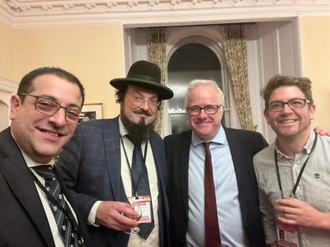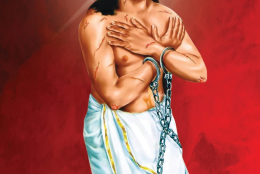The Architecture of the British Christian Right

Dialoguing on community are l-r: Rabbi Alex Goldberg, Rabbi Yechezkel Mandelbaum, Francis Davis, Sam Howson (film maker), Credit: Francis Davis
The churches in Britain often fret about their 'decline'. To an emergent extra parliamentary political force trying to build up its strength though they offer hundreds of budget centres with billions in resources, thousands of local outlets with millions of members as well as cultural leverage, imagery, assets and networks into neighbourhoods like no other. And right now Tommy Robinson, leader of 'Uniting the Kingdom' rallies outside refugee hotels and in central London, is keen both to do more in those churches and to roll up as an active member of them. At one of his network's large-scale events in Southampton recently rallying cries for national purity were combined with speeches calling for Christian revival and 'pulling the walls' of Britain's elites down.
A few commercial consultancies and think tanks have emerged to organise a 'resistance' but fragmentary efforts will likely not work. Indeed, this moment of social crisis that has emerged from the attempt to capture the churches by the political Right and Radical Right, and build associated popular movements beyond them, needs thorough transparency and a deeper and wider resistance than such pop up ventures can afford. The attempts at political capture are long standing with some seemingly respectable actors providing gateways to the more radical forces now upon us.
In 1990 I penned an article for the journal Radical Quarterly. I noted that Mrs Thatcher's Downing Street and Home Office had recently got behind a new business, Evangelical Enterprise (EE), to 'unlock the strong organisations of the black churches' to give the Right access and pursue the business of faith. EE was led by a protégé of Thatcher's Head of Policy, the now Lord Brian Griffiths of Fforestfach. He has emerged recently as a powerful advocate of a global network of extra parliamentary, parliamentary and business voices clustered around a new Right 'Alliance for Responsible Citizenship' (ARC). While a few of their gathering's speakers are clergy seeking to convey hope, many of ARC's interlocutors are hostile to Muslims as a matter of principle. In a recent speech to parliament (17th July) one of them, Danny Kruger MP, carefully air brushed Roman Catholic historical experience from England's history entirely.
In the same 1990 article I noted that Right wing thing tanks were bringing American Roman Catholic reactionaries such as Michael Novak to the UK and this would be a harbinger of what those think tanks were telling me would be a 'long march through the institutions' to capture the voice, networks, reach, cultural leverage of churches and others to move such communities to their side. What in the future would be at stake, I suggested in subsequent articles, was not a debate about 'conversion' as an interior move without public consequences but a whole life question of which side one would stand politically.
In pursuit of role models for the latter I noted that Cardinal Henry Edward Manning, a key contributor to the creation of Catholic social thought, had resisted the rise of any kind of view of Englishness that foreclosed on the rights of Irish migrants, homeless needs, destitute children or the accumulation of capital at the expense of economic moral accountability for the outcomes of markets. The power of the state should be used to house the poor and defend migrants, Manning thought.
That said, in 2011, in debate with the now Lord Maurice Glasman and the think tank Res Publica's Philip Blond, I observed that both had got Manning wrong. That is to say that throughout his episcopal career Manning's radicalism was resisted from within the church by prelates and superiors who wanted an easier, more hierarchical, more commodified Right wing order of social affairs. Simple appeals to a generic and normative 'Catholic social teaching' where everyone was on the same side would not do. An option for the poor at home and abroad would have to become core business. In 2013, I swam a mile in every county raising funds for military veterans with post service mental health needs. In each place I visited community and public service workers. Long before the Brexit Referendum and the current crisis I found veterans and carers wild with an ever stronger anger at how they had been failed. I noticed that as the mainline churches had become more obsessed with their own 'growth' or 'decline' they had become less and less available to offer a social critique of such systemic failures.
From victims of egregious crimes, to unjoined-up health and social care, to cliff like collapses in welfare support for frail citizens turning 18 or 65, to failures in ecclesiastical abuse, I found social institutions fleeing the places and people who needed them most. In these places the Right and the Far Right were beginning to offer snake oil solutions that too often blamed any number of social groups, who themselves were often struggling, for local woes. Back at home on the South Coast we gathered Sikhs and Muslims, adults and children, the Vicar, the Mayor and the MP, white kids and black students around the English flag at the local Anglican Church and shouted that this flag and the place we stood in belonged to all of us. One of those young Sikhs present is now a government minister.
British Church leaders have in the main been silent on such matters in the more than a decade since. Social action group after social action group has fretted first about their theological purity or overstated the significance of a micro community project in the face of systemic inequalities. In every mainline denomination funding has been removed from urban priority areas and social responsibility - to building active citizenship - and turned towards spiritual interiority and headcount metrics. At one level this may have felt energising but at another it has just opened pathways of entry for the social forces of the Right and hard Right to see the Churches as easy pickings.
Speeches in and from London in institutions and fora that are in great part no longer trusted beyond their halls provide media opportunities for the few while the many - hard working sparkies, painters, veterans , carers, Imams, mothers and young refugees - cloak their houses in English flags in search of pride, or write to their Councillor or headteacher that they are frightened to come to Mosque or school.
All political parties are failing here but the Right rising has been hiding in plain sight while new depoliticised conceptions of mission have been ladled out by the religious to increasingly suburban congregations across the country. In chasing easy discipleship religious leaders have ducked the hard yards of action and analysis and profound political resistance to their take over. Even now some who are seeking to push the Right back seem more affronted that the spiritual reputation of Jesus might be tarnished by such associations rather than the material needs of the people.
In a new longer read for the University of Southampton, I argue that this retreat of leadership has been fuelled and underpinned even by self-styled 'political theologians' who have claimed to be analysing our times without ever harnessing the political sciences who have been laying the rise of the Right bare for 40 years. I map out some of the budgets, networks, and movements who have, and are, providing the gateway drugs of narrow theology through which Tommy Robinson's activists could now to build a wider dealership in our midst.
This moment of crisis is bigger than 'growth' or 'decline'.
How, now, are you going to choose sides - of the migrant and the struggling family failed by our system but who needs real change and solidarity not more division?
Francis Davis is a Visiting Fellow at Kellogg College, University of Oxford and Honorary Professor at Queen Mary, University of London. He was previously a trustee of Portsmouth Catholic Diocese.
You can download 'Architecture of the British Christian Right: A case Study in Political Capture' from the University of Southampton Centre on English Identity and Politics at: www.southampton.ac.uk/~assets/doc/fss-international/British%20Christian%20Right%209.10.pdf















